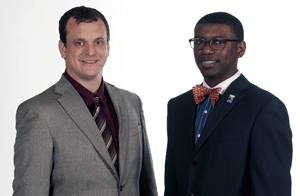Junior UAMS Researchers Win Funding for Asthma, Cardiovascular Studies
Sept. 5, 2013 | UAMS researchers Joshua Kennedy, M.D., and Elvin Price, Pharm.D., Ph.D., are the newest recipients of the Translational Research Institute KL2 Scholar Career Development Awards, which will provide them with salary and research support for two years. The two junior investigators were selected from a competitive pool of applicants this summer. Kennedy is striving to reduce asthma-related hospitalizations by reducing the exacerbating effects of cold viruses on asthma. Price is studying promising genetic predictors that he hopes will help doctors prescribe the right cardiovascular medicines for their patients. “We had an excellent group of applicants and we are excited to have Dr. Kennedy and Dr. Price as our 2013 KL2 Scholars,” said Curtis Lowery, M.D., director of the Translational Research Institute and principal investigator for the National Institutes of Health (NIH) Clinical and Translational Science Award (CTSA) that supports the KL2 Scholar program. “We hope the KL2 Award will help jumpstart their research careers and put them on a path toward sustained NIH funding to further their research.” Kennedy and Price are among 13 KL2 Award recipients selected by the Translational Research Institute since 2010. The award helps them quickly develop their research programs with 75 percent salary support (up to $52,000 a year) that allows dedicated time to their research. They receive up to $25,000 a year in research funds, as well as travel funds, graduate-level tuition support, and assistance from mentors. Personalized Medicine Price’s research addresses the fact that only about half of new prescriptions written for high blood pressure actually lower blood pressure to the goals that are set for the patient on the first attempt. “It’s like flipping a coin,” he said. “Blood pressure response to medicine is highly variable and some genetic factors are shown to contribute to the likelihood of response.” | This sets up a costly and time-consuming trial and error period to find the right medications for each patient. Using pharmacogenomics, or personalized medicine, Price hopes to help physicians choose the best therapy for newly diagnosed high blood pressure patients and for other cardiovascular diseases. Price is interested in specific nuclear receptor genes that contribute to blood pressure and cholesterol regulation. Like power switches, genetic variability can cause the receptors to be on or off, which can help predict a person’s blood pressure and cholesterol levels. Price will apply this knowledge in a clinical trial at UAMS, testing various blood pressure and cholesterol medications on white blood cells in the lab. “Instead of wasting four to six months to see if a drug lowers your blood pressure or cholesterol, we can just treat your cells to see how they respond and tailor therapies accordingly,” he said. “I am very grateful for the KL2, and I am hopeful the citizens of Arkansas will benefit from this project.” Price earned his Doctor of Pharmacy degree from Florida A&M University in Tallahassee and his doctorate in clinical pharmaceutical sciences from the University of Florida in Gainesville. Bad Synergy Kennedy, an internal medicine and pediatrics physician, fell in love with research during his fellowship training in allergy and immunology at the University of Virginia. His research has already shown that an asthmatic’s immune response to rhinoviruses (cold viruses) is much different than in people who don’t have asthma. “Asthma patients respond with cytokines, which are inflammatory markers and mediators that are biased toward their asthma and allergy,” said Kennedy, an assistant professor and allergist/immunologist. “There’s a synergy between the patient’s allergy and asthma that puts them in the hospital.” Between 60 and 80 percent of asthmatic children end up in the hospital when they get a cold virus, a costly burden to patients and the health care system. Non-asthmatics, however, have an immune response that kills the cold virus. Kennedy, based at the Arkansas Children’s Hospital Research Institute Lung Cell Biology Laboratory, is hoping to alter asthmatics’ response to viral infections to keep them out of the hospital. He is working closely with his mentors, Richard Kurten, Ph.D., and Stacie Jones, M.D., to answer questions like: What causes the dangerous immune response? Is it possible to determine which patients will respond that way? And what is the synergy between allergy and asthma? Patients’ nasal samples taken by Kennedy will be grown in the lab and infected with viruses for further study. That includes taking samples from patients who show up in the Emergency Department to determine if their cytokine responses are consistent with lab findings. Kennedy, a Hot Springs native, earned his medical degree and completed residency training at UAMS. He joined the UAMS faculty in July after completing his allergy and immunology fellowship. “The KL2 Award is going to be extremely effective in growing and nurturing my career,” he said.
|
